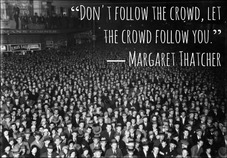 You’d be forgiven for thinking that I believe everything Grant Cardone says but trust me, I really don’t – he just says a lot of stuff that I already believe and he has a great way of putting it. In Sell or Be Sold, I loved his statement that, “Anything a lot of people do can’t be good for you”. In this particular instance he was talking about TV. He asked, “What do you do between 5am and 8pm every day?” His belief: when you get home spend quality time with your loved ones. Switch off the TV. When you’re done hanging out with the family make a list of contacts you’re going to call the next day then hit the hay. Grant Cardone argues that TV watching is what everyone does – they do way too much of it – and that is a dead giveaway that it can’t be good for you. I Agree. Ration TV watching. The quantity and quality should both be controlled. News: waste of time. Documentaries: choose the good ones and watch those. They don’t all have to be about business. Personally, I enjoy documentaries on people that have a different life to mine, e.g. in Britain, following the credit crunch, there was a period when there were lots of documentaries on people that live on state benefits, people that live on council estates, immigrants, etc. and I watched many of them. I not only learnt a few things about how others live but it made me even more grateful for what I have. Businesswise I love Bloomberg GameChangers but I think I have watched them all. I also enjoy The Apprentice, Dragon’s Den (it’s like Shark Tank in the US) and there are numerous programs on experts helping businesses grow – e.g. The Business Class with James Caan (it wasn’t that good to be honest), shows with Alex Polizzi, etc. Now, for relaxation I’m partial to Criminal Minds, Scandal, Undercover Boss, Storage Hunters, The Face (it’s better than America’s Next Top Model but I like that too), The X-factor but only with Simon Cowell, home improvement shows and weight loss shows (e.g. the Biggest Loser) to name a few. That said, I usually can’t watch my favourite shows when they are on because the commercials waste a lot of time. To solve this problem I record and watch when time allows; this way I can skip through the commercials. Frequently, I watch a series several months after it’s finished –I always watch Scandal a few months after it’s finished over a 3- or 4-day period when I think I deserve a reward. Overall, I think I watch a lot of TV but I also realize I watch far less than most. The other time I caught my mum telling my dad, “You wouldn’t think there’s a TV in this house, it’s always off.” Not true. It was on even less when she was around probably because I was trying to spend quality time with her. I normally watch 1 to 2 hours of TV a day in the week and 2 to 4 hours on each of Saturday and Sunday. When I’m super tired and my brain can’t think anymore I can watch TV the whole day because it’s so mentally uninvolving – this is way too much  These are my TV watching habits – what are yours? I found some interesting stats on TV watching in America. By ethnic groups, Nielsen finds that:
I don’t even know what to make of these numbers. Personally I think poverty and not race has more to do with these numbers. Asian Americans are on average wealthier than white Americans who in turn have higher incomes than African Americans. As TV is a very cheap form of entertainment, the lower one’s income level the more of it you do. However, does this then lead to a culture of TV watching? It’s also generally accepted that Asian parents push their kids harder to excel in school leading to the myth that Asians are the smartest when in fact hard work has more to do with it. Although correlation does not imply causation I personally find these TV watching stats worrying because reading is just as cheap if not cheaper than TV. I bought 22 Walt Disney Classics for Little Zeusy just before he was born for £0.29 (44 cents) each at a local charity shop. All of them were almost brand new. I could not believe it – 22 books for less than it costs for a pack of cigarettes. I then decided to look at smoking stats by income level. Interestingly:
Smoking is a cripplingly expensive habit. An article on thinkprogress.org states that smokers in New York who earn less than $30,000 a year spent on average almost a quarter (23.6%) of their annual income on cigarettes, while the state’s wealthier smokers — defined as those earning over $60,000 a year — spent an average of just 2.2% of their earnings to support their smoking habit. So clearly, there might be a lack of knowledge regarding “good habits” at lower income levels. However, I also found evidence online that tobacco companies target more of their marketing at low-income groups because the stresses of their lives make them more likely to take up the habit. And because the habit is so common amongst lower income groups it is more accepted and much harder to give up than is the case amongst the more affluent. Anyhow, the links here are complex. I aim only to make one point. If you choose to break away from something that most people do the impact can be dramatic. Shun TV and substitute that time with listening to audiobooks or actually reading quality books and you will gain a lot of useful knowledge. Substitute smoking for going to the gym and the health benefits can and will translate into wealth benefits too. Anything lots of people do is probably NOT good for you. How will you be different?  Want to Build a 6-Figure Beauty Business from the comfort of your sofa? Then my course is designed for YOU! "Beauty" includes a WIDE range of products from the not so obvious non-perishable foods and crafts to the more obvious hair, makeup, fashion, health & fitness.
0 Comments
Leave a Reply. |
Heather on WealthI enjoy helping people think through their personal finances and blog about that here. Join my personal finance community at The Money Spot™. Categories
All
Archives
September 2023
|
Heather Katsonga-Woodward, a massive personal finance fanatic.
** All views expressed are my own and not those of any employer, past or present. ** Please get professional advice before re-arranging your personal finances.
 RSS Feed
RSS Feed


